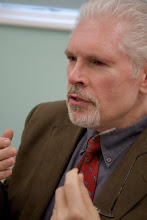I was looking forward to Kane’s Blasted for weeks. In class, my group was given the task of presenting on an article about Kane’s work and “in your face” theatre seemed like all I had been waiting for and more. I am not a squeamish member of the audience and I’m rarely shocked by things, so I wasn’t worried about that aspect of the play. I was excited to see the brutal, violent, disgusting, cringe-worthy scenes that I knew Blasted would offer. As instructed, I made sure not read any of the script before seeing the show, which only increased my anticipation. Walking into the theatre, which seemed far too traditional of a venue, for this type of fringe theatre, I was eager for the experience to come. I was not ready for the disappointment to come.
The play begins and within the first fifteen minutes, a man is completely naked on stage; this would not be my first choice of things to see, but it did set the mood of the play. Up until the first break the play featured a disgusting sexual tension and a violence in the atmosphere that, however brutal for some to watch, was something that I felt was gritty and believable. At this point in the play I still expected greatness. I did not know where the story was going, but I still believed in Kane’s Brilliance.
The second and third acts completely left the realm of reality and enjoyment. A soldier knocks on the door and the whole play goes to shit for me. An awkward five minutes of eating is followed by an even more awkward anal rape and cannibalism scene. In between these two events is a ridiculously unconvincing talk on the horrors of war. As the play falls further and further down the whole of dark fantasy, a bomb find its way into the scene and further cannibalism ensues. Brilliant, except for not really. I could not be drawn into this world, it was far to unbelievable in nature and execution for me to connect. To accompany this unrealistic world was a performance I could not stand by the female lead. The soldier’s dialogue and over-the top nature was even more displeasing. I did enjoy the male leads performance however, and felt he did the best possible job with the character, so I guess I can end on that positive note.
While thinking about Blasted, I accept that the events in the play are “in your face,” but I don’t think these violent or shocking scenes should not be accompanied with meaning. It seemed that all of these events only helped to convey the message that, “human beings have the potential to be really fucked up.” Regardless of the truth behind this statement, I did not feel it was enough. Before shocking “in your face” theater was more widespread, shocking for the sake of shocking may have been acceptable, but I think that time has passed. I feel that a message or at least the attempt to give the audience a message is the most important part of theatre and for that reason, the play I was most excited for was the play that I hated the most.
-Christopher Mahoney

Yo Chris, I thought your post was pretty surprising. Here I was thinking that people were either on one end of the spectrum or the other: either hating the play and feeling disgusted by the content or being disgusted and liking the play. Yet your experience seems to connect the two and fall somewhere in between. I thought it was interesting how you sought more meaning from the actions in the play instead of getting lost in the shock value like so many people did. Yet I suppose you can't forget to think in context of the play's history too, with it's debut dating back 15 years ago when, you're right, "shocking for the sake of shocking may have been more acceptable". We can't expect after Sarah Kane's passing that her play would be revised to meet today's standards so maybe it would be good to explore more current In Your Face theatre? Which actually gets me hoping that there is similar theatre available to us in the states. All in all a very good analysis and reflection of Blasted.
ReplyDelete- Andrew Zapata, UCLA